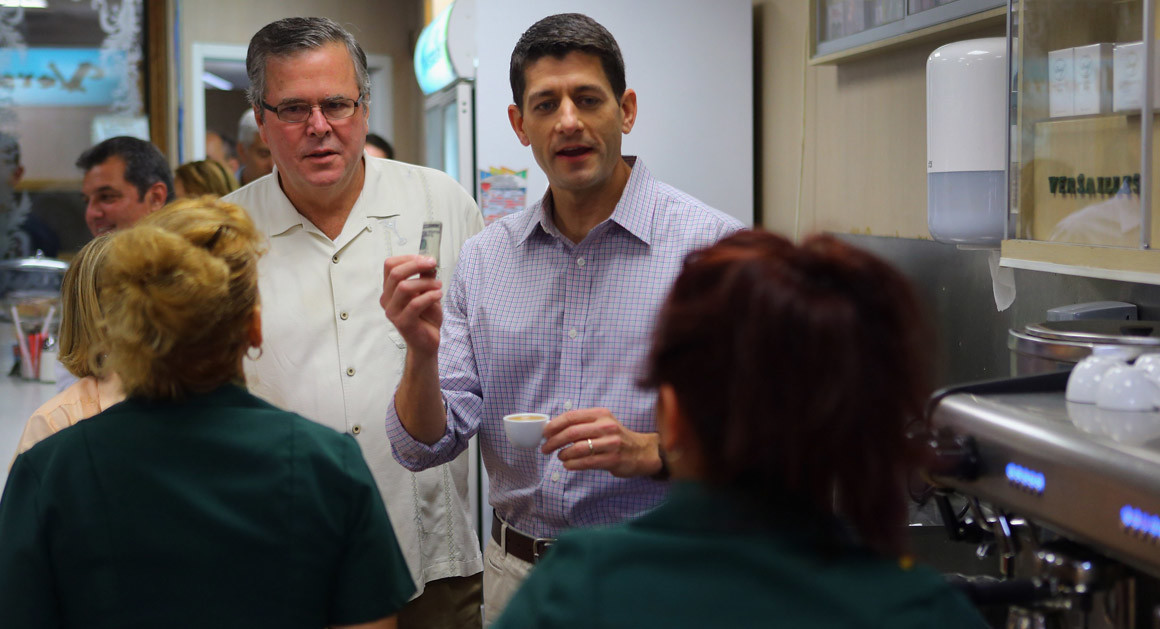
Jeb Bush unveiled his proposal to overhaul Social Security and Medicare this morning, embracing a politically risky conservative platform as he tries to revive his flagging campaign.
Bush’s plan would transform Medicare into a premium support program, adopting one of Rep. Paul Ryan’s most controversial budget ideas to give beneficiaries a set amount of money to purchase either a private insurance plan or traditional Medicare. But Democrats have demonized Medicare privatization plans the past two election cycles as shredding the safety net and cast Republican backers as granny killers.
On Social Security, Bush proposes gradually raising the retirement age by one month every year starting in 2022 and giving bigger checks to those who hold off collecting Social Security until the full retirement age. (Under current law, workers are eligible for reduced benefits starting at age 62 and full retirement benefits at 66 — though that’s set to increase gradually to 67.)
Both the Medicare and Social Security proposals carry huge political risks since they would tweak the benefits of senior citizens, the country’s most powerful, reliable voting bloc that’s represented by well-funded lobbying organizations like the AARP.
Despite that, Bush seems prepared to pick up the conservative mantle, saying the current path forward is unsustainable.
“If we do not have an honest conversation about what it will take to protect Medicare and Social Security, we fail seniors and we will fail the next generation of Americans,” he wrote in a blog post accompanying his plan.
On Medicare, he proposes shifting the federal program from an open entitlement to a so-called defined benefit plan, which would give seniors a set amount of money to buy a health care plan either from the traditional government option, or from a private company. His rivals, Gov. Bobby Jindal and Sen. Marco Rubio, have proposed similar changes. Ben Carson, meanwhile, has called for replacing Medicare with cradle-to-gave health savings accounts funded with $2,000 a year in government contributions.
Chris Christie would like to gradually raise the eligibility age of Medicare and ask seniors, starting with those who earn $85,000 a year in income, to pay higher health care premiums.
And Donald Trump, in his new book "Crippled America" pledged not to cut Medicare benefits, although his health care chapter doesn't spell out any details about how he would deal with the financial and demographic pressures.
Under Bush's plan, the government would calculate its contribution to seniors by averaging the cost of both the public and private plans. Conservatives tend to love this idea because it would give the government greater predictability about how much it would spend each year. Democrats contend government support wouldn’t keep up with seniors’ rising health costs.
Campaign documents argue that Bush’s proposals would lower costs by encouraging competition and giving seniors a greater choice of coverage options. Critics of this model say it would expose a majority of seniors, or 6 out of 10, to higher premiums and would force those living in high-cost states to pay more out of pocket.
Bush would also ask wealthy seniors to pay for a greater share of Medicare health benefits through means-testing, but the campaign did not specify the income threshold. That’s already begun in parts of Medicare, but Bush would take it further.
Making wealthier people pay more is a popular idea among conservatives, but Medicare advocates worry that it would transform Medicare into a program that disproportionately helps lower-income and middle-class people — potentially weakening the program’s political clout if all seniors do not benefit equally.
The plan "would move towards Bush’s goal to 'phase out' Medicare, by voucherizing the program, which could drive up health care costs for retirees," said Christina Freundlich, a spokeswoman for the Democratic National Committee. "And his plan to raise the retirement age is consistent with his philosophy of Americans needing to 'work longer hours.' Sound familiar? This is classic Republican trickled-down economics — helping millionaires and corporations at the expense of seniors and the middle class.
Bush's plan would also preserve more than $800 billion in Medicare cuts under Obamacare, which Republicans attack in the 2012 campaign. The Republicans support the cuts, which reduce payments to insurers and health care providers, but they complain that Democrats diverted the savings to create a new entitlement under Obamacare. Bush would use it to reduce the deficit.
Additionally, Bush’s plan would allow seniors to continue to contribute money tax-free to health savings accounts to pay for out-of-pocket health-related expenses.
Like any good government proposal, Bush also seeks to save money by eliminating waste and fraud from the Medicare system. He also calls for reforms to how providers are paid for their services, shifting away the fee-for-service system. That’s an idea that has bipartisan support, although not everyone agrees on the details.
This morning’s proposal is Bush’s second plan in recent weeks to overhaul the U.S. health care system. In mid-October, he unveiled his plan to repeal and replace the Affordable Care Act by turning over much of the control to the states and relying on tax credits to help some Americans buy catastrophic health insurance.
- Publish my comments...
- 0 Comments
